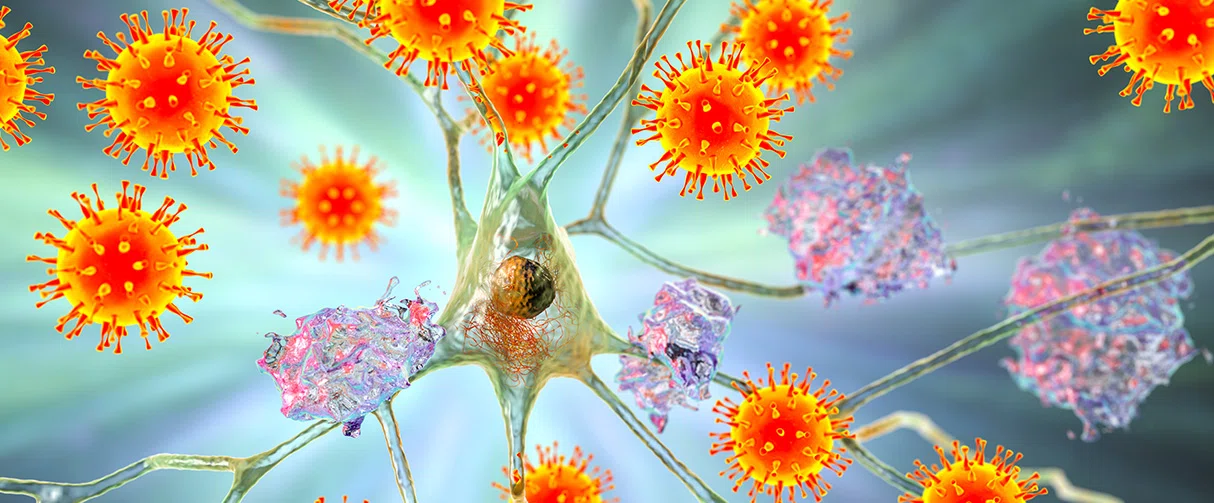


Precision Medicine
COVID-19 Infection in Crucial Brain Regions May Lead To Accelerated Brain Aging
The disease may put vulnerable individuals at risk for irreversible neurological conditions.

Since SARS-CoV-2 infection was first detected in humans in December 2019, the disease, through the virus’ many variants, continues to pose a serious threat to global health. While the respiratory symptoms are more well-known, COVID-19’s deleterious effects on other organs in the human body are being actively investigated.
In a new Ageing Research Reviews article, Houston Methodist researchers have consolidated the emerging insights and evidence that suggest COVID-19 infections may have both short- and long-term neurological effects. Major findings include that COVID-19 infections may predispose individuals to develop irreversible neurological conditions, may increase the likelihood of strokes and may increase the chance of developing persistent brain lesions that can lead to brain bleeding.
“Microhemorrhages caused by SARS-CoV-2 infections in crucial brain regions can speed up brain aging in COVID-19 survivors and can also lead to complex and irreversible neurodegenerative conditions that can severely impact cognitive and motor functions,” said corresponding author Muralidhar Hegde, Ph.D., professor of neurosurgery with the Center for Neuroregeneration at the Houston Methodist Research Institute.
Still a major burden on our daily lives, a great deal of research has shown that the impacts of the disease go far beyond the actual time of infection. Since the onset of the pandemic, COVID-19 has surpassed a death toll of more than 5.49 million worldwide and over 307 million confirmed positive cases, with the U.S. accounting for almost 90 million of those cases, according to the Our World in Data website.
Muralidhar Hegde, PhD
Professor of Neurosurgery at Houston Methodist
COVID-19 has numerous impacts on the central nervous system. For instance, 20-30% of COVID-19 patients report a lingering psychological condition known as “brain fog” where individuals suffer from symptoms such as memory loss, difficulty in concentrating, forgetting daily activities, difficulty in selecting the right words, taking longer than usual time to complete a regular task, disoriented thought processes and emotional numbness.
SARS-CoV-2-associated neurological impacts on the brain. Image adapted from Mitra et al., 2022
The coronavirus infection can cause long-term and irreversible damage to the brain, particularly in the elderly and other vulnerable populations. Several brain imaging studies on COVID-19 victims and survivors have confirmed the formation of microbleed lesions in deeper brain regions involved in cognition and memory. In this review, researchers have critically evaluated the possible chronic neuropathological outcomes in aging and comorbid populations if timely therapeutic intervention is not implemented.
Cerebral microbleeds are emerging neuropathological signatures frequently identified in individuals suffering from depressive syndromes, chronic stress, type II diabetes, and other age-associated comorbidities. Based on their earlier findings, the Houston Methodist investigators discuss how COVID-19-induced microhemorrhagic lesions may exacerbate DNA damage in affected brain cells, resulting in neuronal senescence and activation of cell death mechanisms, which ultimately impact brain microstructure-vasculature. These pathological phenomena resemble the hallmarks of neurodegenerative diseases like Alzheimer’s and Parkinson’s and are likely to aggravate advanced-stage dementia, as well as cognitive and motor deficits.
“Importantly, individuals over the age of 60 with pre-existing neuropathological conditions might be at the highest risk of developing chronic neurodegeneration,” said Joy Mitra, PhD, an instructor with the Center for Neuroregeneration and lead author of the study.
More severe long-term effects include predispositions for Alzheimer’s, Parkinson’s and related neurodegenerative diseases, as well as cardiovascular disorders due to internal bleeding and blood clotting-induced lesions in the part of the brain that regulates our respiratory system, following the COVID-19 symptoms. Additionally, cellular aging is thought to be accelerated in COVID-19 patients. A plethora of cellular stresses inhibit the virus-infected cells from undergoing their normal biological functions and let them enter into “hibernation mode” or even die completely.
The study also suggests various strategies to improve some of these long-term neuropsychiatric and neurodegenerative outcomes, as well as outlines the importance of the therapeutic regimen targeting hemorrhage-induced neurotoxicity in combination with various FDA-approved drugs that may prove successful to fight against COVID-19.
However, given the ever-evolving nature of this field, associations like the ones described in this review show the fight against COVID-19 is far from over, said the investigators, and reinforce the message that getting vaccinated and maintaining proper hygiene are key in trying to prevent such long-term and detrimental consequences.
Joy Mitra, Manohar Kodavati, Vincent E. Provasek, K.S. Rao, Sankar Mitra, Dale J. Hamilton, Philip J. Horner, Farhaan S. Vahidy, Gavin W. Britz, Thomas A. Kent, Muralidhar L. Hegde, SARS-CoV-2 and the central nervous system: Emerging insights into hemorrhage-associated neurological consequences and therapeutic considerations, Ageing Research Reviews, Volume 80, 2022, 101687, ISSN 1568-1637, https://doi.org/10.1016/j.arr.2022.101687.
Ella Hohmann, MS, September 2022
Related Articles





